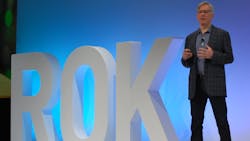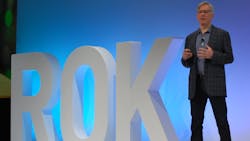Simplification and ingenuity lead industry forward
Emerging from a haze and walking into a new dawn requires a guiding light and the ability to see a clear and simple path forward. Rockwell Automation has mounted simplification and ingenuity as headlights to guide industry out of the darkness and into the post-pandemic economy.
“We’ve learned to take our products and our software and our services and combine them together for industry needs,” explained Blake Moret, chairman and CEO, Rockwell Automation, who kicked off the Perspectives program, held this week in the run up to Automation Fair 2022 in Chicago. “We’ve added more consulting capabilities and more landing spots for data. We can offer simplification. That is what will sort out the winners and losers—the simplification of technology and simplification of business models. It’s about managing risk. We’re touching the insights that will fuel success, customer by customer and industry by industry.”
Rockwell is solely focused on industrial automation and digital transformation, said Moret. “Why are we doing this?” he asked. “To simplify complexity, so we can meet customers where they are. All of us have existing infrastructure. It’s that industry-focused ingenuity.”
“We’re connecting the imaginations of people with the potential of technology, to expand human possibility and keep it focused on real business results, and that’s the why that drives me and drives our company,” explained Moret.
“The last time we were here was 2019,” said Moret, recalling a previous Automation Fair in Chicago. “It was the biggest show Rockwell had ever had. It was a new highwater mark. We were starting to invest more, and then the world changed—and not just from a professional standpoint. It changed from a personal standpoint, as well. We are all changed forever in the way we live and the way we work.”
Moret remembered how it changed one Rockwell customer, a large food company, that was focused on adding line extensions to drive productivity and looked to increase its cybersecurity to protect its data. “With the pandemic, everything changed overnight,” said Moret. “This company was selling in bulk to the hospitality industry.” Instantly, its business model changed because no one was going out to eat in a restaurant, so the company had to shift its focus to other distribution channels.
The line extensions increased because the company was increasing the number of SKUs. “People were buying from the grocery store,” explained Moret. There was still a focus on cybersecurity. In fact, it was even more of an issue because people were working at home, creating more opportunities for cyber-attacks directed at remotely connected users.
Rockwell was there for critical industries that were making masks, packing food, providing transportation and generating energy, said Moret. “We were right in the middle of it,” he announced. “I was happy with our ability to adapt and solve these problems quickly when we needed to. We saw 20 years of evolution happen in just two because we had to. It came with costs, but it’s making us more resilient, more agile and more sustainable.”
Moret noted customers such as Barrett Steel and Kraft Heinz that worked with Fiix and Plex, respectively, two relatively recent Rockwell acquisitions, to democratize technology and scale operations—including elements of enterprise resource planning functionality once outside its province. “That’s a new set of muscles for us, but one that’s working very well,” said Moret, who also mentioned how Rockwell’s ingenuity brought a win to a Hyundai greenfield EV plant in Georgia.
He highlighted five components of industry-focused ingenuity:
- “We’re optimizing productivity,” said Moret. “That’s the heart of what Rockwell has provided. You can’t make a competitive automobile without robots.”
- “It’s empowering workers,” he added. “It’s basic training and providing the tools. It’s giving these workers superpowers and providing the capabilities to enhance workers and expand human possibility.”
- “Managing risk means cybersecurity and safety,” Moret explained. “Cybersecurity was expanded to a workforce that was mostly at home. We’ve had to find the money and resources to mitigate these sorts of risks.”
- “We’re driving sustainability by helping manufacturing companies to use less water and energy,” he said. “We’re enabling the ability to shed loads and manage energy. We’re working with the energy suppliers and helping fossil-fuel companies with their energy transitions.”
- “IT is the key lever to accelerate growth through the digital transformation,” said Moret. “We’re building that connectivity in the digital architecture from the ground up, to be able to connect devices. We’re adding the ability to exchange data between software applications as IT comes down to the plant floor.”
Get the best of Automation Fair 2022
When the event comes to a close, the best, most important coverage will be compiled into a report. Register now to pre-order the report and be among the first to receive it in your inbox.


